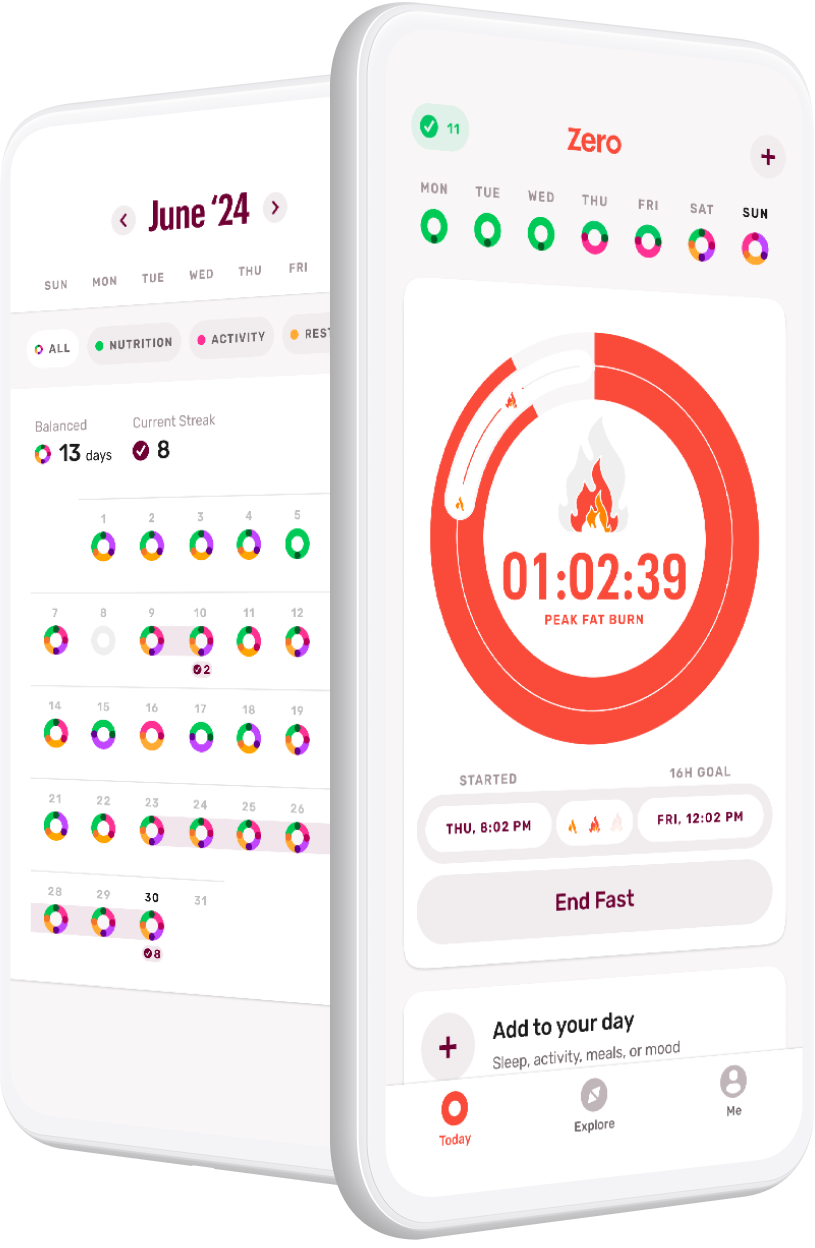It’s true: Fasting and weight loss go hand in hand. In fact, a 2023 meta-analysis, which included nine randomized control trials, reported significantly more weight loss with time-restricted feeding (intermittent fasting) versus the non-intermittent fasting control group. With metabolic disease on the rise — recent statistics indicate that almost 100 million people, or over 40% of US adults struggle with obesity — it’s more important than ever to find a sustainable and permanent solution to weight loss.
Fasting is a simple, straightforward strategy to manage a healthy body weight — and Zero helps you turn that into a habit. Keep reading for the why and how.
Does Fasting Help with Weight Loss?
Regardless of your “why,” fasting helps with weight loss. When you condense your eating window by intentionally extending your overnight fast, you’re able to naturally reduce your calorie intake, turn on fat-burning pathways, and reduce body fat without the need to count calories.
There are a number of ways to practice intermittent fasting, but much of the most recent study data suggest that fasting daily for 12–20 hours is highly beneficial. What makes fasting so simple and effective is that it often just means bookending your natural overnight fast with a few extra hours every day.
What the Science Says About Fasting for Weight Loss
The general consensus within the weight-loss literature is that adherence is the greatest predictor of weight-loss success. In contrast with standard diets that rely heavily on calorie counting, intermittent fasting has much higher adherence rates — 60% versus 80–90%, respectively. Notably, a 12-month trial published in 2023 reported 87% adherence to intermittent fasting.
Fasting has incredible benefits for health and longevity (weight loss included) but that doesn’t mean fasting is for everyone. We recommend you speak with a medical professional before taking on a fasting protocol to make sure it’s the right choice for you.
How Does Fasting Help People Lose Weight?
At the most basic level, people find that they inadvertently eat less when they eat less frequently. This makes fasting incredibly practical because it’s less about what you eat and more about the when— but the what is still important, too.
Take a late-night snack, for example. Does it have anything to do with your appetite or does it have more to do with the fact that you stayed up a bit later than you should have? Defining your eating window prevents snacking and grazing at both ends of your day, which can eliminate excess calories that contribute little to what your body actually needs.
There’s another reason why eating less frequently might make you eat less: Every meal is a challenge to your powers of restraint. If you have a tendency to go back for seconds, or struggle with portion control even when you aren’t hungry, shortening your eating window can also help reduce meal frequency. On average, people eat within a 15-hour window, so cutting that down to just 8 hours shaves off 7 hours worth of potential overconsumption.
Finally, fasting enables your body to switch from carbs to fat as a source of fuel, a process referred to as “metabolic switching.” On average, it takes at least 12 hours of fasting to deplete the body of its glucose and glycogen stores before it starts to shift to a more abundant fuel source — fat. Switching from carbs to fat boosts your metabolic flexibility, or the ability to use a variety of fuel sources to meet energy demands. In turn, this enables you to accelerate fat burning and reach your weight-loss goals faster.
Conclusion: Fasting Helps You Focus on the Long Term
Remember: Weight loss isn’t always linear. You might find that it fluctuates from day to day or week to week. Because of that, you may choose to log your weight to see the bigger picture and spot overall trends. Being aware of your progress can either motivate you to stay on track or help you identify whether you need to make any changes to reach your health goals — including adjusting your fasts!
- Fasting Zones: What’s the Difference Between Anabolic and Catabolic? - December 19, 2023
- What’s the “Best” Fasting Regimen for Weight Loss? - March 6, 2023
- Can You Do a 16:8 Fast Every Day? - May 25, 2021

